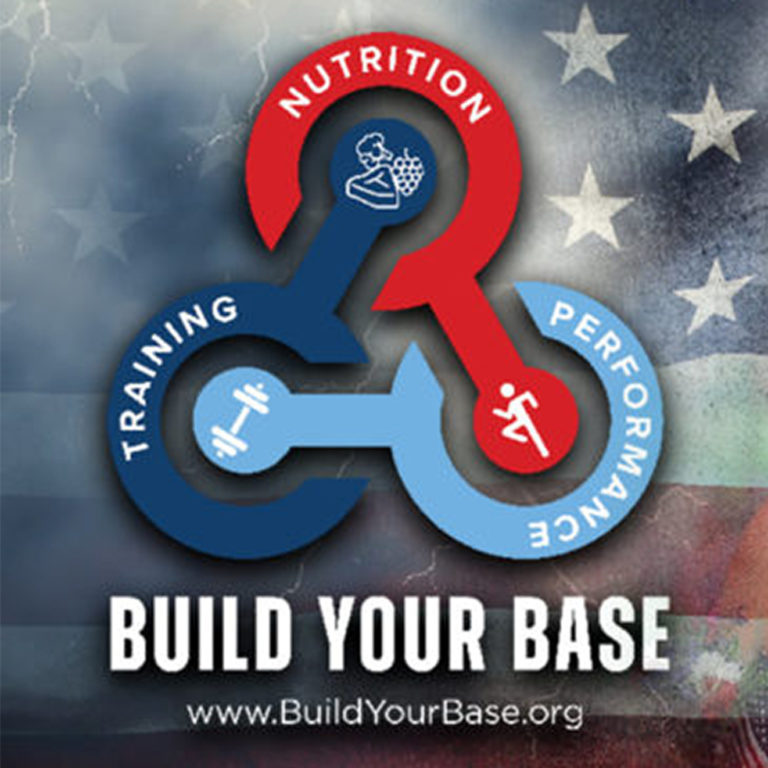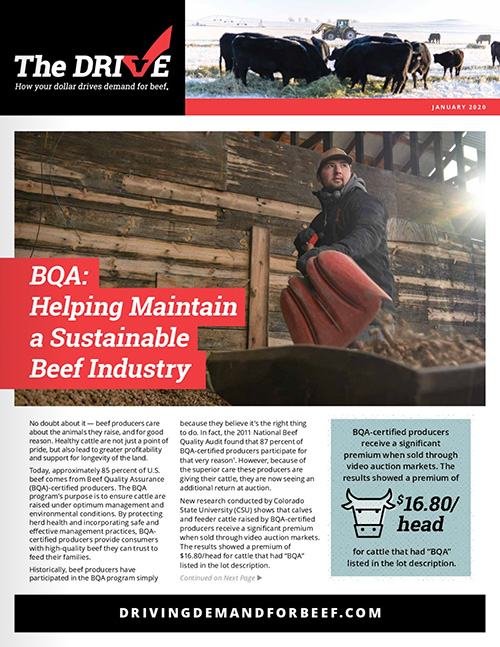The Science Behind Promoting Beef
Did you know that the Beef Checkoff funds research to better understand beef’s role in health? The Beef Checkoff works alongside universities and institutions to conduct high-quality scientific research on beef’s nutritional benefits, providing a sound factual basis to promote beef’s role in a healthy diet and drive demand.
The Human Nutrition Research Program works to nourish and optimize Americans’ health at every life stage – from infants to the elderly. And what is the best way to reach health-conscious consumers and parents? By connecting with physicians, physician assistants, dietitians, nursing professionals and certified fitness professionals to provide them with accurate nutrition resources and continuing education opportunities, which they in turn use to inform their patients and clients on the nutritional benefits that beef provides. Explore the different types of beef research and see how the Checkoff uses this key research to execute Checkoff-funded health professional education programs.
Evidence-Based Research
Health and medical professionals must make evidence-based health recommendations for their patients and clients. Here are some key research studies demonstrating that beef is a foundational food that nourishes and optimizes Americans’ health at every life stage.
- Meat Helps Every Bite Count: This paper summarizes that infants, starting at six months of age, need high quality dietary sources of iron and zinc as their internal stores begin to deplete. The unique nutrient-dense matrix of iron-rich red meat, such as beef, makes it an ideal first complementary food to help meet an infant’s nutrient needs. Because infants and toddlers eat small quantities of foods, it is critical to make every bite count in the early years. This recommendation is included in the 2020-2025 Dietary Guidelines for Americans.
- Iron-Rich Complementary Foods: With nearly one in five infants in the United States not consuming adequate iron, this paper highlights the role that iron-rich foods, such as beef, can play in supporting neurological development and immune function.
- Beef in a Mediterranean-Style Diet Supports Heart Health: In a randomized crossover controlled feeding trial, the gold standard of nutrition research, data supports the growing body of scientific evidence demonstrating the role of lean beef in a healthy eating pattern to support heart health and increase flexibility for healthy eating. Researchers demonstrated how Mediterranean-style diets with up to 5.5 oz of fresh, lean beef, daily, improved blood cholesterol levels, benefitting adults at risk of developing heart disease.
- Substituting Lean Beef for Carbohydrates in a Healthy Dietary Pattern: Observational studies, which are conducted by observing a population over time, have suggested that red meat intake is associated with increased risk of developing type 2 diabetes and heart disease. However, observational studies are easily confounded or biased, thus a randomized crossover-controlled feeding trial (RCT), the gold standard of nutrition research, was conducted to determine the effect of beef on risk factors of developing diabetes and heart disease. When an additional 5.3 ounces of fresh lean beef was included in the healthy dietary pattern, replacing a portion of the carbohydrates, there was no adverse impact on risk for type 2 diabetes or cardiovascular disease, such as insulin sensitivity and blood cholesterol levels. This study is important because it reinforces that red meat can be part of a healthy eating pattern.
- Red Meat Consumption and Risk Factors for Type 2 Diabetes: A systematic review of randomized controlled trials evaluated the effects of diets containing red meat, compared to diets with lower or no red meat, on risk factors for development of type 2 diabetes. The researchers concluded that diets containing red meat do not have a negative impact on risk factors for Type 2 diabetes (including glycemic and insulinemic markers.)
- The Potential Role of Beef on Outcomes of Wellbeing: Aging is a critical life stage being investigated by the Beef Checkoff. A systematic review of randomized controlled trials evaluated evidence linking the intake of beef and nutrients found in beef to markers of wellbeing in healthy older adults. Of the limited research available, the researchers saw an overall positive effect of beef and its nutrients on wellbeing and physical function of adults older than 50 years of age.
Credible, evidence-based research is the first step to effectively reaching and communicating with health professionals. Built on a strong foundation of data, the Beef Checkoff has the opportunity to share information in a multitude of ways, across various platforms, campaigns and resources. Here are five ways human nutrition research is shared with health and medical professionals.
1. Podcasts
Gaining major popularity in recent years, podcasts are audio recordings that can be listened to via the internet on a smartphone, tablet or computer. Listeners can access podcasts at any time, on demand, which gives healthcare providers a flexible way to gain additional knowledge on health and nutrition, focusing on topics of specific interest to them. Podcasts also provide a unique way for health professionals to earn their required continuing medical education (CME) credits. The three podcasts below have been downloaded more than 8,500 times, with more than 1,500 listeners completing CME credits via the podcasts.
2. Medical Advertising
Through advertisements in leading pediatric and medical journals and magazines, the Beef Checkoff provides scientific evidence about beef’s role in a healthy diet. These digital and print advertisements recently reached more than one million health professionals.
3. In Office Educational Content for Pediatric Health Professionals and Parents
Checkoff-funded educational toolkits are given to pediatric health professionals’ offices nationwide. Each toolkit includes a newsletter, 100 consumer booklets, exam room posters and a new research flyer, and each office receives a digital E-Blast. Recently these toolkits were distributed to 3,090 pediatric health professional offices in 32 states.
4. Webinars and Conferences
Through a partnership with Today’s Dietitian Magazine, an educational webinar was held with Katie Ferraro, Master of Public Health, Registered Dietitian Nutritionist and Certified Diabetes Educator, to highlight beef in the early years. Ferraro’s webinar, “Self-Feeding from Baby’s First Bites: How to Incorporate Baby-Led Weaning in Your Practice,” had more than 1,700 live attendees, and approximately 181 survey responses from attendees. Post-presentation surveys revealed 70 percent of those who responded would make changes to their practice based on knowledge gained in the presentation and 93 percent agreed that beef can safely support babies’ developmental needs and serve as the foundation for lifelong eating patterns.
5. Newsletters
The National Cattlemen’s Beef Association (NCBA), a contractor of the Beef Checkoff, executes many of the human nutrition research program initiatives, such as distributing regular newsletters with targeted messages to nutrition influencers and scientists. The nutrition influencer newsletter reaches more than 6,000 recipients every quarter. The nutrition research newsletter is distributed bi-annually to more than 170 top nutrition researchers.
Programs in Action: Beef in the Early Years
Utilizing all of these promotional and communication methods is the Beef in the Early Years campaign. Launched in 2021 as a result of the Dietary Guidelines for Americans recommending animal-sourced foods, as a foundational food to support healthy growth for infants and toddlers, Checkoff-funded Beef. It’s What’s For Dinner. Has seen highly successful results. While the main targeted audience was health professionals, the results and information reached beyond that to consumers.
Beef in the Early Years has made its way to consumers with Beef. It’s What’s For Dinner. creating and distributing attention-getting materials, infographics, preparation guides, eating tips, videos, recipes and more to engage with parents and health specialists alike.
This year, Beef. It’s What’s For Dinner. has expanded the campaign’s messaging reach, connecting with broader audiences of physicians and nutrition experts, including those involved with the Women, Infants and Children Program (WIC), as well as reaching more parents online. Beef in the Early Years messaging is promoted through YouTube, Google search, Facebook, Pinterest, Twitter, Spotify and podcasts, all reaching more than 1.7 million consumers and more than 1.3 million health professionals. In total, since its launch, Beef in the Early Years has reached more than 32 million consumers with information that supports introducing beef to infants around six months of age.
By leveraging high-quality, evidence-based research on beef’s role in a healthy diet and strategically promoting that information through multiple efforts and platforms, the Beef Checkoff helps to drive demand for beef. To learn more about the Human Nutrition Research Program, visit: https://www.beefresearch.org/programs/human-nutrition
The Beef Checkoff program was established as part of the 1985 Farm Bill. The checkoff assesses $1 per head on the sale of live domestic and imported cattle, in addition to a comparable assessment on imported beef and beef products. States may retain up to 50 cents on the dollar and forward the other 50 cents per head to the Cattlemen’s Beef Promotion and Research Board, which administers the national checkoff program, subject to USDA approval.

































